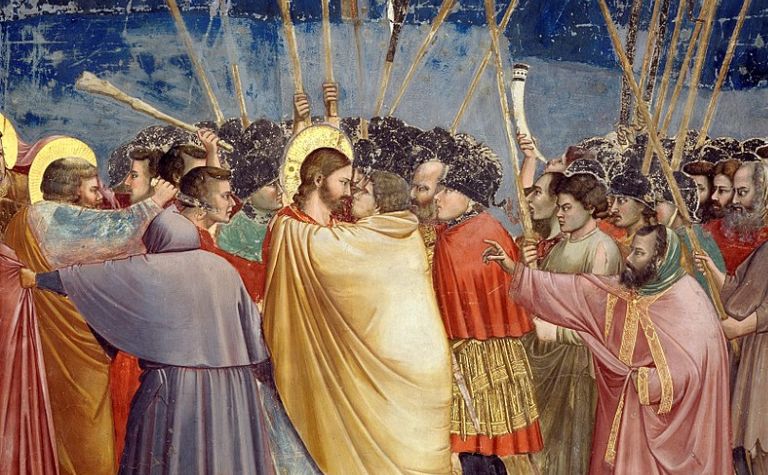Just the name “Judas” elicits thoughts of deception, unfaithfulness, and greed. The betrayer is one of the most well-known villains in the Bible, alongside the Pharaoh that Moses confronted, Goliath, who David killed, and of course, Satan himself. One of the most common questions people have about Judas concerns his motivation for the most infamous betrayal in history.
Judas Iscariot betrayed Jesus Christ for 30 pieces of silver, an act that fit his deceptive character and weakness in the midst of temptation. Judas’ disappointment with Jesus’ refusal to establish an earthly kingdom and his desire to align with those with political and religious power were also factors.
How did Jesus disappoint Judas? Did the disciples trust Judas? Did Jesus? How did Judas betray Jesus? What role did Satan play in Judas’ betrayal? What did Judas receive for betraying Jesus? Keep reading to learn the answers to these questions and others.
Also see What Year Was Jesus Christ Crucified? to learn more.

What do the Gospels teach about Judas?
The Bible doesn’t reveal a lot of information about Judas. Almost nothing is known of his life prior to joining Jesus’ disciples. The name “Judas” was common in the first century, illustrated in the fact there are six different men named Judas in the New Testament. His father was named Simon Iscariot (John 6:71); their surname probably referred to the city of Kerioth found in southern Judah (cf. Josh. 15:25).
Was Judas greedy for money? Money played a key role in Judas’ life, eventually leading to his downfall. He was the treasurer for the disciples, and many scholars think he may have worked a finance-related job before following Jesus. The Gospels refer to Judas as a “thief” who betrays Jesus for money, which suggests he had a great weakness when faced with financial temptations.
- John 12:6, “[Judas] said this, not because he cared about the poor, but because he was a thief, and having charge of the moneybag he used to help himself to what was put into it.” (ESV)
- John 13:29, “Some thought that, because Judas had the moneybag, Jesus was telling him, Buy what we need for the feast, or that he should give something to the poor.” (ESV)
How did Jesus disappoint Judas? Some scholars hold that, like many first-century Jews, Judas expected the Messiah to establish an earthly kingdom, like David had, and topple the Roman Empire. Some wonder if Judas sought a position of power in a new political system, perhaps with oversight of the finances.
Yet when Jesus revealed his actual purpose for coming into the world, John reports that “many of his disciples turned back and no longer walked with him” (John 6:66). Jesus then spoke specifically of his betrayer: “Did I not choose you, the twelve? And yet one of you is a devil. He spoke of Judas the son of Simon Iscariot, for he, one of the twelve, was going to betray him” (John 6:70-71).
Did the disciples trust Judas? At one point, the disciples trusted Judas with the finances of the ministry. But, like Satan, who would later enter him (more below), he was a master deceiver. Even when Jesus revealed that one of them was a betrayer (John 13:21), according to John, they still didn’t suspect Judas: “The disciples looked at one another, uncertain of whom he spoke” (John 13:22).
Did Jesus ever trust Judas? Jesus knew from the start that Judas was going to betray him. He said, “There are some of you who do not believe. (For Jesus knew from the beginning who those were who did not believe, and who it was who would betray him).” Jesus chose the 12, including Judas (John 6:71). Jesus never trusted Judas because he knew what he would do (cf. Zech 11:13).
Also see How Many Lashes Did Jesus Get? to learn more.

How did Judas betray Jesus?
Mark writes that religious leaders plotted to murder Jesus. “It was now two days before the Passover and the Feast of Unleavened Bread. And the chief priests and the scribes were seeking how to arrest him by stealth and kill him, for they said, ‘Not during the feast, lest there be an uproar from the people'” (14:1-2). These leaders would soon have a co-conspirator on the inside of Jesus’ movement — Judas.
What role did Satan have in Judas’ betrayal? The religious leaders weren’t the only ones targeting Jesus. Luke reports that “Satan entered into Judas called Iscariot, who was of the number of the twelve” (Luke 22:3). Then when the religious leaders heard Judas’ plan, “they were glad and promised to give him money.”
Matthew reports that the agreed-upon amount was 30 pieces of silver (Matt. 26:15). Zechariah foretold the amount of 30 pieces of silver over 400 years prior (Zech. 11:13). Mark continues, “And [Judas] sought an opportunity to betray him” (Mark 14:10-11; cf. Luke 23:5).
How did Judas identify Jesus for the religious leaders? Judas betrayed Jesus with a kiss, which was true to his deceptive character. However, Jesus knew his intentions the whole time. “There came a crowd, and the man called Judas, one of the twelve, was leading them. He drew near to Jesus to kiss him, but Jesus said to him, Judas, would you betray the Son of Man with a kiss?” (Luke 22:47-48).
Also see What Is the Gospel of Jesus Christ? to learn more.

What did Judas receive for betraying Jesus?
After the authorities arrested Jesus, Judas felt guilty. Matthew writes, “Then when Judas, his betrayer, saw that Jesus was condemned, he changed his mind and brought back the thirty pieces of silver to the chief priests and the elders, saying, I have sinned by betraying innocent blood.” (Matt. 27:3-4)
The religious leaders didn’t care about Judas’ guilty conscience. “What is that to us? See to it yourself,” they replied. “And throwing down the pieces of silver into the temple, he departed, and he went and hanged himself.” (Matt. 27:5)
“Who delivered up Jesus to die? Not Judas, for money; not Pilate, for fear; not the Jews, for envy; but the Father, for love (see Romans 8:32)!” – Octavius Winslow
Also see Who Am I In Christ? to learn more.
References:
[1] Source
[2] Source
Related Questions
The crucifixion of Jesus of Nazareth is one of the most pivotal moments in world history. The death of a poor Jewish carpenter during the days of the Roman Empire wouldn't ordinarily have garnered...
The crucifixion of Jesus Christ is one of the most important events in the Bible. Jesus' death on the cross, as well as his resurrection from the dead, are the climactic moments in the New Testament...
